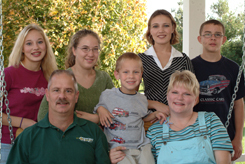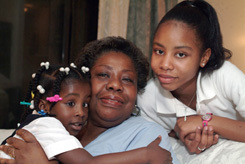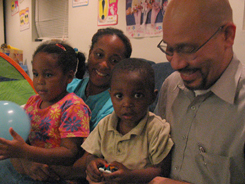
The laws of every State and the District of Columbia require all prospective adoptive parents (no matter how they intend to adopt) to participate in a home study. This process has three purposes: to educate and prepare the adoptive family for adoption, to gather information about the prospective parents that will help a social worker match the family with a child whose needs they can meet, and to evaluate the fitness of the adoptive family.
The home study process can be a source of anxiety for some prospective parents, who may fear they will not be "approved." It may be helpful to remember agencies are not looking for perfect parents. Rather, they are looking for real parents to parent real children. With accurate information about the process, prospective parents can face the home study experience with confidence and the excitement that should accompany the prospect of welcoming a child into the family.
Specific home study requirements and processes vary greatly from agency to agency, State to State, and (in the case of intercountry adoption) by the child's country of origin. This factsheet discusses the common elements of the home study process and addresses some concerns prospective adoptive parents may have about the process.
If you are just beginning your journey to adoption, you may find the Information Gateway factsheet, Adoption: Where Do I Start? useful. Information Gateway also offers the National Foster Care & Adoption Directory, a searchable database listing public and licensed private agencies, attorney referral services, support groups, State adoption specialists, and more for each State, Territory, and the District of Columbia. These resources, as well as factsheets with specific information on special types of adoption (such as foster care or intercountry), can be found on the Child Welfare Information Gateway website.
Elements of the Home Study Process
There is no set format that adoption agencies use to conduct home studies. Many agencies include the following steps in their home study process, although the specific details and order will vary. For more information, talk with the agencies you are considering.
Training
Many agencies require trainings for prospective adoptive parents prior to or during the home study process. These trainings help prospective parents better understand the needs of children waiting for families and help families decide what type of child or children they could parent most effectively.
Interviews
You will probably be interviewed several times by the social worker. These interviews help you develop a relationship with your social worker that will enable him or her to better understand your family and assist you with an appropriate placement. You will discuss the topics addressed in the home study report (see below). You will likely be asked to explain how you handle stress and past experiences of crisis or loss. In the case of couples, some agency workers conduct all of the interviews jointly, with both prospective parents together. Others will conduct both joint and individual interviews. If families have adult children living outside the home, they also may be interviewed during this process.
Home Visit
Home visits primarily serve to ensure your home meets State licensing standards (e.g., working smoke alarms, safe storage of firearms, safe water, adequate space for each child, etc.). Some States require an inspection from the local health and fire departments in addition to the visit by the social worker. The agency will generally require the worker to see all areas of the house or apartment, including where the children will sleep, the basement, and the back yard. He or she will be looking for how you plan to accommodate a new family member (or members, if you are planning to adopt a sibling group). Social workers are not typically inspecting your housekeeping standards. A certain level of order is necessary, but some family clutter is expected. Some agencies would worry that people living in a "picture perfect" home would have a difficult time adjusting to the clutter a child brings to a household.
Health Statements
Most agencies require prospective adoptive parents to have some form of physical exam. Some agencies have specific requirements; for example, agencies that only place infants with infertile couples may require a physician to confirm the infertility. Other agencies just want to know the prospective parents are essentially healthy, have a normal life expectancy, and are physically and mentally able to handle the care of a child.
If you have a medical condition that is under control (for instance, high blood pressure or diabetes that is controlled by diet and medication), you may still be approved as an adoptive family. A serious health problem that affects life expectancy may prevent approval. If your family has sought counseling or treatment for a mental health condition in the past, you may be asked to provide reports from those visits. Many agencies view seeking help as a sign of strength; the fact that your family obtained such help should not, in and of itself, preclude you from adopting. However, each family's situation is unique, so check with the agencies or social workers you are considering if you have concerns.
Income Statements
You do not have to be rich to adopt; you just have to show you can manage your finances responsibly and adequately. (Some countries may have specific income requirements for intercountry adoption.) Usually, prospective parents are asked to verify their income by providing copies of paycheck stubs, W-4 forms, or income tax forms. Many agencies also ask about savings, insurance policies (including health coverage for the adopted child), and other investments and debts.
Background Checks
Most States require criminal and child abuse record clearances for all adoptive and foster parent applicants. In many States, local, State, and Federal clearances are required. While the vast majority of prospective adoptive parents have no criminal or child abuse history, it is important for children's safety to identify those few families who might put children at risk.
Public and private agencies need to comply with State laws and policies regarding how the findings of background checks affect eligibility for adoptive parents. However, do not hesitate to talk to agencies and social workers you are considering about specific situations that might disqualify you from adopting. Agencies are looking not just at your past experiences, but at what you've learned from them and how you would use that knowledge in parenting a child. Some agencies in some States may be able to work with your family, depending on the charge and its resolution. If the social worker feels you are being deceptive or dishonest, however, or if the documents collected during the home study process expose inconsistencies, the social worker may have difficulty trusting you.
Autobiographical Statement
Many adoption agencies ask prospective adoptive parents to write an autobiographical statement. This is, essentially, the story of your life. This statement helps the social worker better understand your family and assists him or her in writing the home study report (see below). If you are working with an agency that practices openness in adoption, you also may be asked to write a letter or create an album or scrapbook about your family to be shared with expectant birth parents to help them choose a family for their child.
While writing about yourself can be intimidating, the exercise is intended to provide information about you to the agency, as well as to help you explore issues related to the adoption. Some agencies have workers to assist you with the writing. Most have a set of questions to guide you through writing your autobiography.
References
The agency will probably ask you for the names, addresses, and telephone numbers of three or four individuals to serve as references for you. References help the social worker form a more complete picture of your family and support network.
If possible, references should be individuals who have known you for several years, who have observed you in many situations, and who have visited your home and know of your interest in and involvement with children. Most agencies require that references be people unrelated to you. Good choices might include close friends, an employer, a former teacher, a co-worker, a neighbor, or your pastor, rabbi, or leader of your faith community.
Approval would rarely be denied on the grounds of one negative reference alone. However, if it were one of several negative factors, or if several of the references were negative, the agency might be unable to approve the adoption.

The Home Study Report
Typically, the above steps culminate in the writing of a home study report that reflects the social worker's findings. Home study reports often are used to "introduce" your family to other agencies or adoption exchanges (services that list children waiting for families) to assist in matching your family with a waiting child.
In general, home study reports include the above-mentioned health and income statements, background checks, and references, as well as the following types of information:
- Family background. Descriptions of the applicants' childhoods, how they were parented, past and current relationships with parents and siblings, key events and losses, and what was learned from them.
- Education/employment. Applicants' current educational level, satisfaction with their educational attainments, and any plans to further their education, as well as their employment status, history, plans, and satisfaction with their current jobs.
- Relationships. If applicants are a couple, the report may cover their history together as well as their current relationship (e.g., how they make decisions, solve problems, communicate, show affection, etc.). If applicants are single, there will be information about their social life and how they anticipate integrating a child into it, as well as information about their network of relatives and friends.
- Daily life. Routines, such as a typical weekday or weekend, plans for child care (if applicants work outside the home), hobbies, and interests.
- Parenting. Applicants' past experiences with children (e.g., their own, relatives' children, neighbors, volunteer work, babysitting, teaching, or coaching), in addition to their plans regarding discipline and other parenting issues.
- Neighborhood. Descriptions of the applicants' neighborhood, including safety and proximity to community resources.
- Religion. Information about the applicants' religion, level of religious practice, and what kind of religious upbringing (if any) they plan to provide for the child.
- Feelings about/readiness for adoption. There may be a section on specific adoption-related issues, including why the applicants want to adopt, feelings about infertility (if this is an issue), what kind of child they might best parent and why, and how they plan to talk to their children about adoption-related issues. If the agency practices openness, there may be information about how the applicants feel about birth families and how much openness with the birth family might work best. For more information, read Information Gateway's Openness in Adoption: A Fact Sheet for Families.
- Approval/recommendation. The home study report will conclude with a summary and the social worker's recommendation. This often includes the age range and number of children for which the family is recommended.
Applicants also will be asked to provide copies of birth certificates, marriage licenses or certificates, and divorce decrees, if applicable. Some agencies allow prospective parents to read the home study report about themselves; others do not. You may want to ask the agency about the confidentiality of the home study report and how extensively your information will be shared. Agency policies vary greatly, depending on the type of agency and type of adoption. In many cases, the information will be shared with other agencies to help in matching the most appropriate child with your family. In some cases, the information may also be shared with birth parents or others.
How long will the home study take?
The time it takes to conduct the home study will vary from agency to agency, depending on factors such as how many social workers are assigned to conduct home studies, what other duties they have, and how many other people applied to the agency at the same time. On average the home study process takes 3 to 6 months to complete. You can help speed up the process by filling out your paperwork, scheduling your medical appointments, and gathering the required documents without delay.
How much does a home study cost?
The cost of the home study depends on what kind of adoption you are pursuing. Agencies conducting domestic adoptions of children from foster care (such as your local Department of Social Services) may not charge a fee for the home study. If these agencies do charge a fee, they often are modest ($300 to $500), and once you adopt a child from foster care you can usually obtain reimbursement for this fee.
For domestic infant adoption, intercountry adoption, or independent adoption, a private agency or certified social worker in private practice might charge from $1,000 to $3,000 for the home study. Other services (such as an application fee and preplacement services) may be included in this fee. Be sure to discuss any fees thoroughly and ask for this information in writing to avoid any misunderstandings.
For more information about costs of adoption and resources to help defray those costs, see the Information Gateway factsheet, Cost of Adopting.

What might disqualify our family from adopting?
Aside from a criminal record or overriding safety concerns that would preclude agencies from approving your family under your State's laws or policies, characteristics that might disqualify a family in one situation may be seen as strengths in another. Remember, agencies are not looking for "perfect" families. The home study process is a way for a social worker to learn more about your real family, as a potential home for real children.
Who may adopt varies from agency to agency, State to State, and by the child's country of origin. Adoptions in the United States are governed by State law and regulations. Child Welfare Information Gateway has compiled States' laws regarding who may adopt in Statutes at a Glance: Parties to an Adoption. Some States also have their policies posted online. The Information Gateway publication, State Child Welfare Agency Websites, has links to each State's online adoption information. Within State guidelines, many agencies are looking for ways to rule families in rather than rule them out, to meet the needs of children in the U.S. foster care system waiting for adoptive families.
Thousands of children in the U.S. foster care system are waiting for families. The AdoptUsKids website provides a national online photolisting of children in foster care. Information Gateway offers a complete listing of State Child Welfare Agency Websites on its website.
How will the children in our family be involved in the home study?
Children in your family (whether they joined your family through birth, foster care, adoption, or marriage) will be included in the home study in some way. Older children may be invited to participate in age-appropriate groups during one or more of the educational sessions. They also might be asked to write a statement describing their feelings and preferences about having a new brother or sister.
The social worker will likely ask how the children do in school, what their interests and hobbies are, what their friends are like, and how their behavior is rewarded or disciplined. However, the emphasis will more likely be on how the children see a new sibling (or siblings) fitting into the family and whether they are prepared to share your time and attention. Children's input is usually quite important in the overall assessment of a family's readiness to adopt a child. The social worker will want to make sure that an adopted child or children will be wanted and loved by all family members from the start.
Conclusion
Although the adoption home study process may seem invasive or lengthy, it is conducted to help you decide whether adoption is right for your family, prepare your family for adoption, and help your family determine which type of child you could best parent. The process also serves to ensure children are placed in loving, caring, healthy, and safe environments.
Flexibility and a sense of humor are vital characteristics when raising children, and they can be useful during the home study process as well. With perseverance and a positive outlook, you will be able to team with the social worker to make this a valuable learning experience-one that will help you do the best possible job in parenting the child who will eventually join your family.
 Print
Print Email
Email







